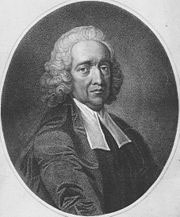1902 Encyclopedia > Stephen Hales
Stephen Hales
English physicist, chemist, physiologist and inventor
(1677-1761)
STEPHEN HALES (1677-1761), physiologist and inventor, was born at Beckesbourn in Kent, on the 7th September 1677. He was the sixth son of Thomas Hales, whose father, Sir Eobert Hales, was created baronet by Charles II. in 1670. Of his early education little is known, but in June 1696 he was entered as a pensioner of Bene't (now Corpus Christi) College, Cambridge, with the view of taking holy orders. On 16th April 1702 he was elected and in February 1703 admitted to a fellow-ship. He received the degree of master of arts in 1703, and of bachelor of divinity in 1711. While at college one of his most intimate friends was William Stukeley, with whom he studied anatomy, chemistry, etc. In 1710 Hales was presented to the perpetual curacy of Teddington in Middlesex, where he remained all his life, notwithstanding that he was subsequently appointed rector of Porlock in Somerset, and later of Farringdon in Hampshire. In March 1717 he was elected fellow of the Royal Society, to whose Transactions he contributed many valuable papers. In 1732 he was named one of a committee for establishing a colony in Georgia, and the next year he received the degree of doctor of divinity. He was appointed almoner to the princess-dowager of Wales in 1750. On the death of Sir Hans Sloane in 1753, Hales was chosen foreign associate of the French Academy of Sciences. He died at Teddington, January 4, 1761.

Stephen Hales
Hales is celebrated as the inventor of a " ventilator," by means of which fresh air was introduced into jails, hospitals, mines, ships' holds, &c. In the four years (1749-52) after its introduction into the Savoy prison, only 4 prisoners died; while previously the mortality had been from 50 to 100 per annum. The invention met with immediate favour, especially in France. Hales was the designer of other inventions by means of which sea-water was distilled, corn cleaned and preserved, meat preserved on long voyages, &c.
His chief writings are his Statical Essays (see CHEMISTRY, vol. v. p. 461), consisting of Vegetable Staticks, or an Account of some Statical Experiments on the Sap in Vegetables (1727), and Haemo-staticks, or an Account of Hydraulick and Hydrostatick Experiments made on the Blood and Blood-vessels of Animals (1733). His essay on The Means of Dissolving the Stone in the Bladder, &c, gained him the Copley gold medal in 1737. His Admonition to the Drinkers of Gin, Brandy, &c., appeared in 1734; the Vegetable Staticks, translated by Buffon, in 1735, and the Haemostaticks, by M. de Sauvages, in 1744. For sketch of his life, with portrait, see Gardener's Chronicle, 1877, pp. 16-17. [--]
|
